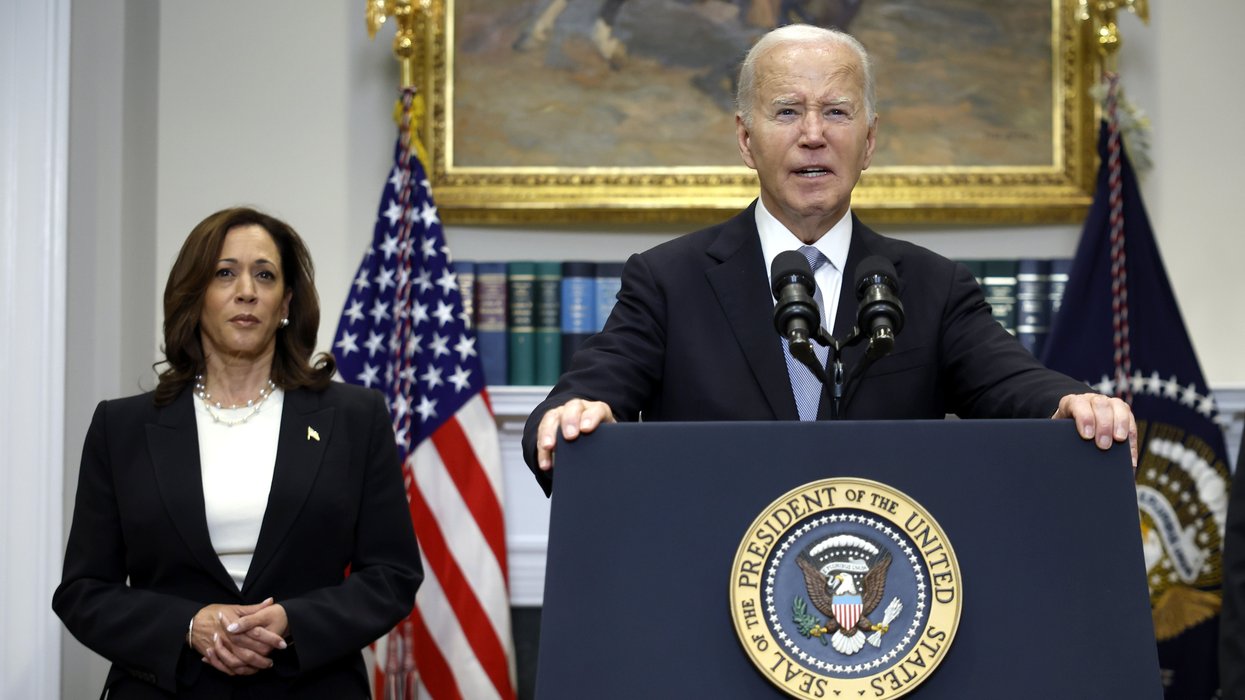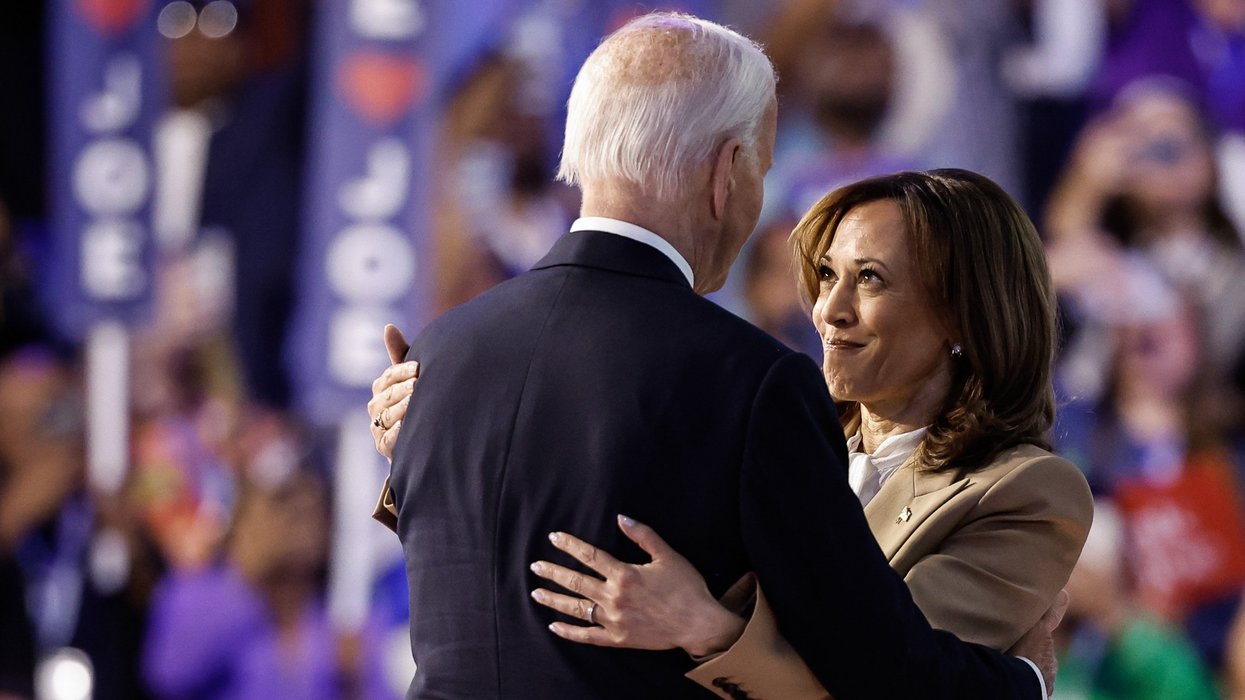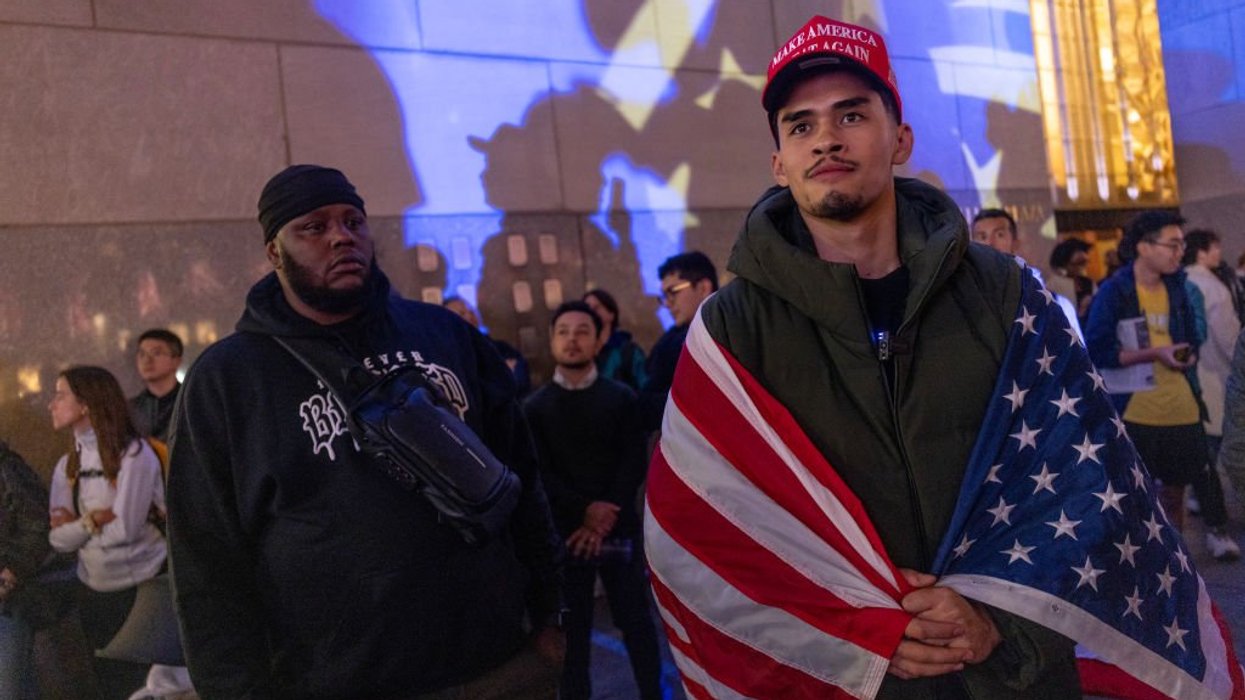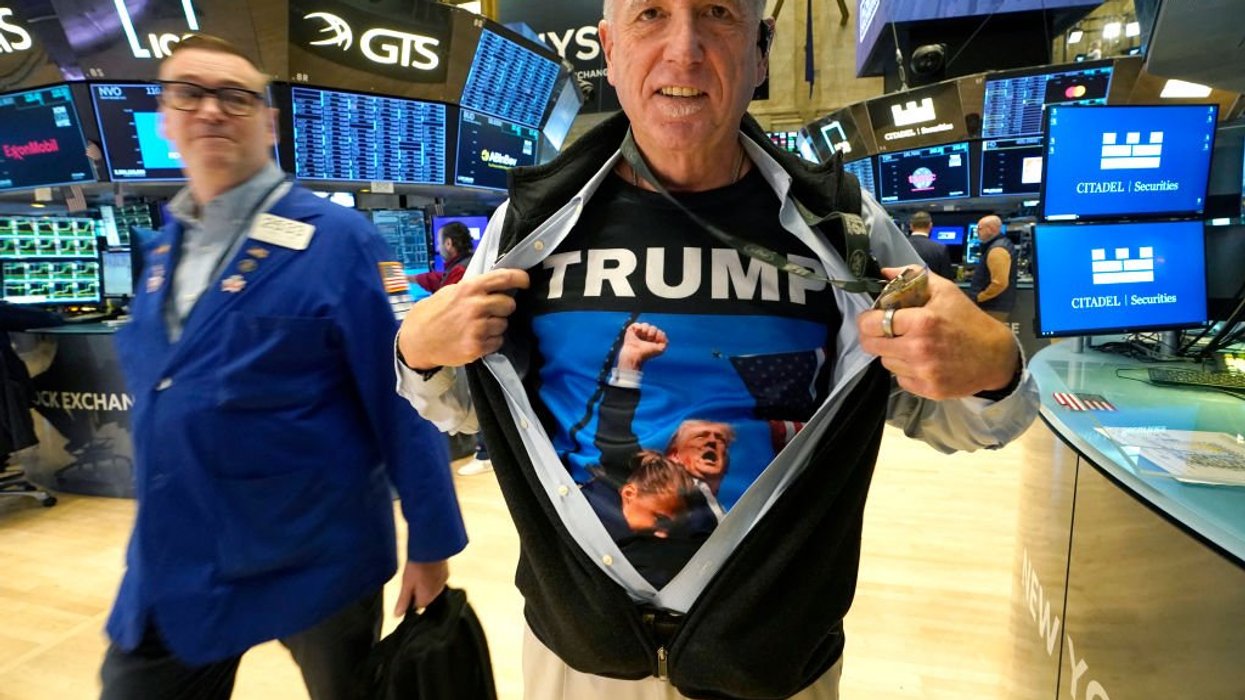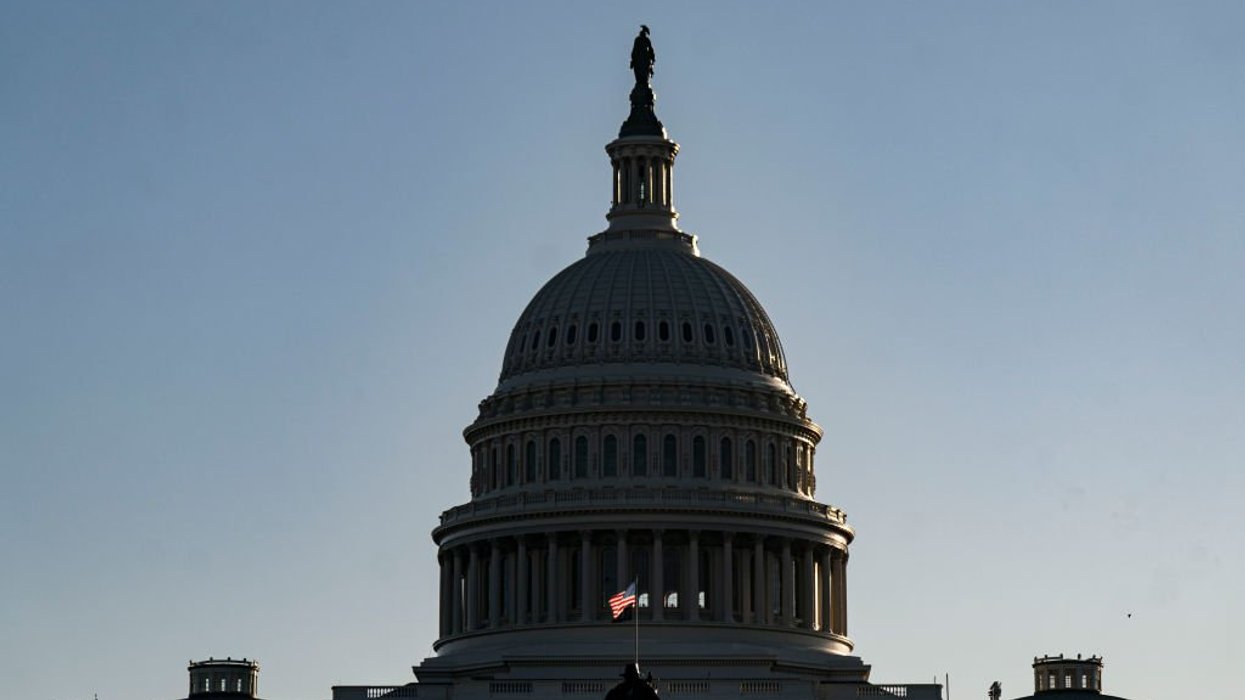Guest hosting while Glenn was off the airwaves Wednesday, Milwaukee County Sheriff David Clarke took control of the microphone, sharing his views on the news of the day. He started his discussion by laying some ground rules.
"This is The Glenn Beck Program. My number one objective is to protect the brand," Clarke said.
Then, he quickly added, "Now, don't get me wrong, like I said, I'm at the helm here. You're going to hear my views. You're going to hear my take on things. It may compare with many of your views, Glenn Beck's views. It might not. But don't take that out on Glenn if it doesn't."
One of Clarke's guests was Monica Crowley, writer for The Washington Times, who joined the program to discuss how the presidential election process is playing out, particularly on the GOP side.
Clarke asked for Crowley's opinion on the "anti-incumbent mood" that has manifested itself among the American people.
"You know, it's interesting because we've not seen anything like this ever," Crowley said.
She continued.
We've certainly had outsiders run and win. You think of Andrew Jackson and some other candidates. And you've also seen impulses before, where voters are just so sick of the incumbents. Throw the bums out. That's been a tag line for American politics since the start.
What we have now is something completely different.
Listen to the segment or read the transcript below for more.
Below is a rush transcript of this segment, it might contain errors.
DAVID: Monica Crowley. She's a writer for the Washington Times newspaper. A prolific writer, I might add. Great insight. And I want to talk to her a little bit about this whole presidential process, what's going on, this dynamic of the -- appears to be the year of the outsider. And why that might be.
Monica, thanks for joining me.
MONICA: Hi, Sheriff. And Merry Christmas to you too, my friend.
DAVID: Thank you, back at you.
Give me your thoughts on this whole process playing out, specifically on the G.O.P. side. This -- this anti-incumbent mood. It's not the first time we've seen it. But kind of not in a presidential sweepstakes. Go ahead.
MONICA: Yeah, you know, it's interesting because we've not seen anything like this ever. I mean, certainly not in our lifetimes, and I would argue maybe never in the history of the republic have we seen a dynamic play out the way it's playing out now. We've certainly had outsiders run and win. You think of Andrew Jackson and some other candidates. And you've also seen impulses before, where voters are just so sick of the incumbents. Throw the bums out. That's been a tag line for American politics since the start.
DAVID: Right.
MONICA: What we have now is something completely different. In that I think particularly on the Republican side, we have a base of voters who time and again have sent Republicans to Washington in waves. In particular, we have two recent wave elections, 2010 and 2014, where we flipped both houses of Congress to Republicans. We have sent Republicans and conservatives to DC with two missions over the last seven years. One, to stop Barack Obama's radical agenda. And two, to advance a conservative one. And in most cases, these Republicans/Republicans have gone there and done neither. There have been some very visible exceptions like Senator Ted Cruz and others. But they have gone there and once again, like those before them, sold out.
And so what you're seeing now is what I argue is the latest incarnation of the Tea Party movement. This is Tea Party 2.0, Sheriff. The initial Tea Party came out of Barack Obama's radicalism, of course. But it also came out of the fact that the Republican Party failed to stand by and fight for its principles: Limited government, fiscal responsibility. They just let all those things fall by the wayside and basically became Democrat-lite. There would have been no need for an original Tea Party movement if the G.O.P. had stuck to its founding principles. Okay? It didn't. So you needed a Tea Party to try to bring it back.
Well, that Tea Party, as we know was squashed by the Barack Obama administration through the IRS and other weapons that they use. And so what you're seeing now, this grassroots movement that is supporting Donald Trump, that's supporting Ted Cruz, that is supporting Carly Fiorina and some of the other outsiders, this is the American people standing up, Sheriff, and saying, you know what, we're done. We're done. We've tried the Republican way. We've sent you off to Washington time and again. You've constantly let us down. And so you know what, we want to try something and someone completely different, somebody who is promising to blow up the system and burn the establishment to the ground.
DAVID: But you know what I find interesting, Monica, first of all, I've always thought about the Tea Party, that was the fighting force. They should have been given a job to be that fighting force within Republican the Republican Party. Actually they face most of their opposition, not from the left, not from the DNC or Democrat Party, but from the G.O.P. I like that Tea Party 2.0. One of the things that I've complained about from the G.O.P. is they don't have an identity. I think that this civil war going on within the party is good. I think that it needs a shaking out, and right now, the fight is for the soul of this party. What are they going to be? What are they going to stand for? And I went through a little bit of a litmus test. I said, "Has this current G.O.P. Congress demonstrated that they're for less government? No. Lower taxes? No. Less spending? No. Military superiority? No." And on and on and on. And I think that's what this -- this frustration is, if you will. I think frustration is a useless emotion. But I think that's what is at the base of it.
MONICA: Yeah, I think that's exactly right. I think, look, if you go in to weed out your garden and you remove half of the weeds, well, then the other weeds continue to grow and they take the garden over again. And I think what voters are saying is, look, we need somebody who is going to uproot this thing. Root and branch, so we can start over again. That's what somebody like Donald Trump is promising to do. They want to start fresh. It's sort of like a scorched-earth policy in their approach to the party and to the conservative movement. And Trump, you can argue whether he's a conservative or not a conservative, but the thing he's projecting is that he's on the outside. He's a successful businessman who will bring executive experience. But more importantly, he's saying to the American voter, look, you don't have to be an enemy in your own country anymore. And you know this better than anybody, Sheriff, because you bore the brunt of this too. The American people have been turned into the enemy in their own nation.
DAVID: That's amazing.
MONICA: If you oppose Barack Obama and the leftist agenda, you're a racist. You're a bigot. You're a homophobe. You're an Islamophobe. You're a sexist. You name it.
And the American people are going, "Wait a minute. Whose country is this?" Trump comes in and says, "We're going to give you your country back. We're going to restore America to its exceptional nature and its greatness. And here's how we're going to do it. We're not going to pay attention to the Republican establishment. Who, by the way, just sold you down the river again with a $1.2 trillion budget that funds everything Obama wanted. What is the point of voting Republican if you send these people to DC and they do what Obama and Pelosi and Reid want? What is the point?"
DAVID: You know what is interesting in this -- and let's just spend a minute on Trump. You know, he's probably the true outsider. You know what you hear. He's not a Republican. He's not a conservative. I'll leave people to argue that.
But one of the other enemies of this Republican establishment is one of their own. It's Ted Cruz.
MONICA: Yeah. I mean, they really don't like Ted Cruz either. And I'll tell you something, Cruz has run a brilliant campaign. Because he was the only one early on, Sheriff, who understood Trump and got what he was doing and got what he was tapping into. Because Trump was tapping into it years ago. Cruz very smartly established something of an alliance with Donald Trump. And the two of them are very helpful with each other with evangelical voters in Iowa, for example. And national security voters on the Cruz side for Trump. They've been implementing each other politically now for seven months. And it has been brilliant on both of their parts. But, look, the establishment is scared to death of these two guys because they will lose total control, not just of the White House, but of the party. The head of the RNC. I mean if you get one of these guys elected president, they control everything. And the establishment knows it will be out. That's why the important thing for everybody to understand here, and I think the American voter gets this on an instinctual level, is that the split in the country is less right/left, blue/red, and more elites versus the rest of us. And what Trump and Cruz are tapping into is, hey, we're one of you. We're with you. We want to protect you and defend this country against the elites on both sides who are destroying it.
DAVID: Right. A finger on the pulse of the American public. The, we, the people. And Trump is really one of the only ones who has established a vision for America, a vision defined as a plan for the future with imagination and wisdom. You know, when he talks about, we're going to make America great again, everybody likes to criticize -- you know, and I don't have a dog in this fight yet. I want to make that clear. I got a couple favorites, but, you know, other than -- other than Trump making America great again, everybody says, "Well, we don't know about his policies. We want to hear about this. We want to hear about his tax policies." Those are policies. It's not vision. All right.
The people in this country right now want to hear about vision. And we're not hearing that from really too many of these candidates.
MONICA: That's exactly right. They want a vision of leadership. Not just who you'll be as a leader, but how you will -- where you'll take the country and what you see for American superpower and our place in the world and how we should exercise that power.
Look, a lot of people, as you say, are critical of Trump because he's put out a specific tax plan and a specific immigration plan. But other than that, you know, the details are pretty sparse. And, you know what, Sheriff, no one cares.
DAVID: Right.
MONICA: I mean, people care. But no one cares because they want the bigger picture, which is what you're saying. They want the vision. And that one slogan he came up with, make America great again. Boom. That is the compelling reason to elect him. Whether he's your choice or not, he has set out a compelling vision and a compelling reason to vote for him. Mrs. Clinton has been on the national scene for 25 years, Sheriff. She still doesn't have a compelling reason for why people should elect her as president beyond I'm a woman and it's my turn. Well, that doesn't -- that doesn't ring out the way make America great again. And that's one of the big reasons why Trump has traction.
DAVID: It's just a power grab by her. Monica, I have to let you go. I want to thank you for joining me.
Merry Christmas, really.
MONICA: It's always a pleasure, Sheriff. Thank you so much, my friend. Merry Christmas to you too.
DAVID: Thank you.
Featured Image: Monica Crowley attends the The Hill, Extra And The Embassy Of Canada Celebrate The White House Correspondents' Dinner Weekend at Embassy of Canada on April 24, 2015 in Washington, DC. (Photo by Dave Kotinsky/Getty Images)

